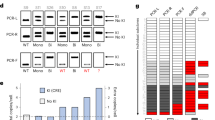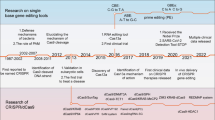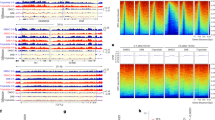Abstract
Cystic fibrosis is the most common inherited disease in the Caucasian population. About 70% of all CF chromosomes carry the ΔF508 mutation, a 3-bp deletion that results in the loss of a phenylalanine at amino acid 508 in the CF transmembrane conductance regulator (CFTR) protein. Direct modification of the ΔF508 locus of endogenous CFTR was achieved by small fragment homologous replacement (SFHR). Transformed human airway epithelial cells (CFBE41o−), homozygous for ΔF508 mutation, were transfected with small fragments (491-bp) of wild-type (WT) CFTR DNA comprising exon 10 and the flanking introns. The DNA fragments were in a liposome–DNA complex at a charge ratio of 6:1 (+:−), respectively). The population of transfected cells was subcloned by limiting dilution at ∼1 cell/well in 96-well plates. Individual colonies were isolated and analyzed. The DNA from several colonies was characterized by radiolabeled, nonallele-specific and radiolabeled, allele-specific PCR amplification, as well as by genomic DNA fingerprinting. The CFTR-WT allele was detected in five of these colonies by allele-specific PCR amplification thus indicating that the cell lines carried both WT and ΔF alleles. DNA fingerprint analysis confirmed that the colonies were isogenic and derived from the parental CFBE41o− cell line. Although, the WT allele was detected by allele-specific PCR, it was not detected initially when the same samples were analyzed by non allele-specific PCR. A sensitivity assay, mixing the genomic DNA of wild-type (16HBE14o−) and mutant (CFBE41o−) cell lines, indicated that the allele-specific PCR was at least 25-fold more sensitive than non allele-specific PCR. These results suggest that the colony is not yet clonal, but still contains a population of parental, CFBE41o− cells that have not been modified. Based on the mixing analysis, the proportion of corrected cells appears to be between 1 and 10% of the total population. Nonallele-specific reverse transcriptase PCR (RT-PCR) analysis of the CFTR mRNA indicated that two of the colonies expressed both WT and ΔF508 CFTR mRNA, while one colony appeared to express only the WT mRNA. The mRNA results were confirmed by sequence analysis of 3′ end primer extension products from the mRNA of CFTR exon 10 showing that the mRNA containing exon 10. Furthermore, a survey of primer extension products indicated no random insertion of the fragment in an expressed gene. This study demonstrates SFHR-mediated modification of the ΔF508 allele in ΔF508 homozygote human airway epithelial cells over multiple generations. The resultant cells express WT-CFTR mRNA and can be subcloned further to isolate isogenic clonal populationsof cells.
This is a preview of subscription content, access via your institution
Access options
Subscribe to this journal
Receive 12 print issues and online access
$259.00 per year
only $21.58 per issue
Buy this article
- Purchase on Springer Link
- Instant access to full article PDF
Prices may be subject to local taxes which are calculated during checkout




Similar content being viewed by others
References
Gruenert DC . Gene correction with small DNA fragments Curr Res Molec Ther 1998 1: 607–613
Gruenert DC . Opportunities and challenges in targeting genes for therapy Gene Therapy 1999 6: 1347–1348
Kunzelmann K et al. Gene targeting of CFTR DNA in CF epithelial cells Gene Therapy 1996 3: 859–867
Goncz KK, Kunzelmann K, Xu Z, Gruenert DC . Targeted replacement of normal and mutant CFTR sequences in human airway epithelial cells using DNA fragments Hum Mol Genet 1998 7: 1913–1919
Goncz KK, Kunzelmann K, Xu Z, Gruenert DC . Targeted replacement of normal and mutant CFTR sequences in human airway epithelial cells using DNA fragments Sangiuolo F et al. In vitro correction of CF cells using SFHR technique. Ped Pulmon 2001; (Suppl 20): 240
Kapsa R et al. In vivo and in vitro correction of the mdx Dystrophin gene nonsense mutation by short fragment homologous replacement Hum Molec Ther 2001 12: 629–642
Goncz K et al. Expression of deltaF508 CFTR in normal mouse lung after site-specific modification of CFTR sequences by SFHR Gene Therapy 2001 8: 961–965
Acknowledgements
We would like to thank Betsy Nelson and Jim Lausier for their expert technical assistance. We would also like to acknowledge the UVM DNA Analysis Facility. These studies were supported by grants from the Cystic Fibrosis Foundation, Pennsylvania Cystic Fibrosis Research, Inc, Regione Lazio, Fondo Sanitario Nazionale per la Prevenzione e la Cura della Fibrosi Cistica and Italian Ministry of Education, University and Research (MIUR).
Author information
Authors and Affiliations
Rights and permissions
About this article
Cite this article
Bruscia, E., Sangiuolo, F., Sinibaldi, P. et al. Isolation of CF cell lines corrected at ΔF508-CFTR locus by SFHR-mediated targeting. Gene Ther 9, 683–685 (2002). https://doi.org/10.1038/sj.gt.3301741
Published:
Issue Date:
DOI: https://doi.org/10.1038/sj.gt.3301741
Keywords
This article is cited by
-
Thymosin α1 represents a potential potent single-molecule-based therapy for cystic fibrosis
Nature Medicine (2017)
-
An ERp57-mediated disulphide exchange promotes the interaction between Burkholderia cenocepacia and epithelial respiratory cells
Scientific Reports (2016)
-
TALENs Facilitate Single-step Seamless SDF Correction of F508del CFTR in Airway Epithelial Submucosal Gland Cell-derived CF-iPSCs
Molecular Therapy - Nucleic Acids (2016)
-
Nanoparticles that deliver triplex-forming peptide nucleic acid molecules correct F508del CFTR in airway epithelium
Nature Communications (2015)
-
∆F508 CFTR interactome remodelling promotes rescue of cystic fibrosis
Nature (2015)



